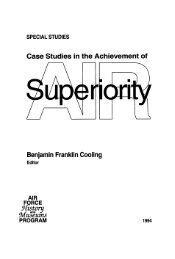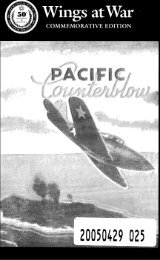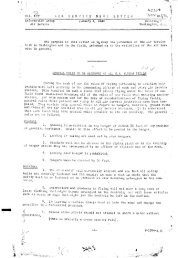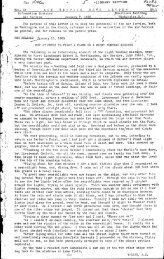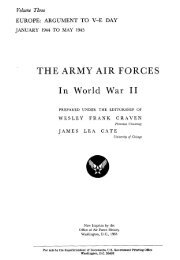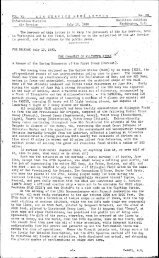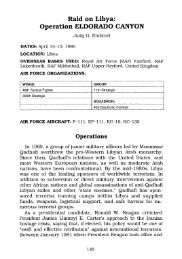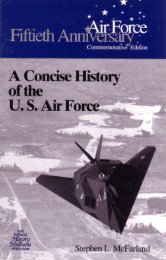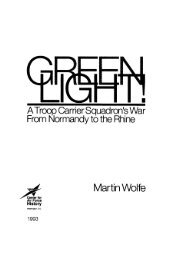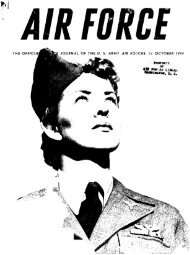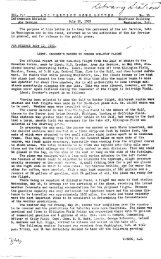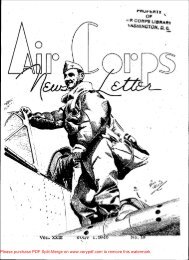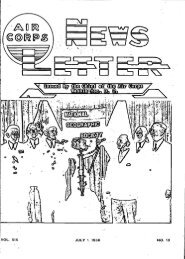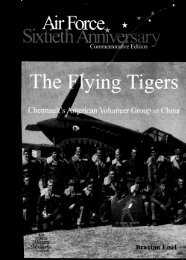- Page 2 and 3:
Piercing the Fog Intelligence and A
- Page 4 and 5:
FOREWORD WHEN JAPAN ATTACKED PEARL,
- Page 6 and 7:
PREFACE THE MILITARY CALAMITY IN EU
- Page 8 and 9:
AUTHORS ALEXANDER S. COCHRAN, Jr.,
- Page 10 and 11:
TABLE OF CONTENTS Page FOREWORD ...
- Page 12 and 13:
Contents Chapter 7 Planning the Def
- Page 14:
Contents P-38andP-51EscortRanges ..
- Page 17 and 18:
Piercing the Fog entered the war, a
- Page 19 and 20: Piercing the Fog prevented from dev
- Page 21 and 22: Piercing the Fog that no modern air
- Page 23 and 24: Piercing the Fog areas, the G-2 had
- Page 25 and 26: Piercing the Fog addressed at war
- Page 27 and 28: Piercing the Fog Events in the war
- Page 29 and 30: Piercing the Fog The G-2-A-7 people
- Page 31 and 32: Piercing the Fog many means to obta
- Page 33 and 34: Piercing the Fog photography and ma
- Page 35 and 36: Piercing the Fog aeronautical devel
- Page 37 and 38: Piercing the Fog naval superiority
- Page 39 and 40: Piercing the Fog GHQ Air Force comm
- Page 41 and 42: Piercing the Fog bases would be ava
- Page 43 and 44: Piercing the Fog target determinati
- Page 45 and 46: Piercing the Fog Japanese Army avia
- Page 47 and 48: Piercing the Fog On the other side
- Page 49 and 50: Piercing the Fog completely changed
- Page 51 and 52: Piercing the Fog aircraft, successf
- Page 53 and 54: Piercing the Fog During 1934-1935,
- Page 55 and 56: Piercing the Fog operations, the st
- Page 57 and 58: Piercing the Fog headed an Air Esti
- Page 59 and 60: Piercing the Fog intelligence compr
- Page 61 and 62: Piercing the Fog as it left the AAF
- Page 63 and 64: Piercing the Fog folders. It was wi
- Page 65 and 66: Piercing the Fog Maj. Gen. Henry H.
- Page 67 and 68: Piercing the Fog already promised t
- Page 69: Piercing the Fog to the Philippines
- Page 73 and 74: Piercing the Fog tactical value and
- Page 75 and 76: Piercing the Fog to assess their po
- Page 77 and 78: Piercing the Fog An Enigma machine
- Page 79 and 80: Piercing the Fog procedures basical
- Page 81 and 82: Piercing the Fog McCormack. They re
- Page 83 and 84: Piercing the Fog The most serious l
- Page 85 and 86: Piercing the Fog To supplement thes
- Page 87 and 88: Piercing the Fog Maj. Gen. Hoyt S.
- Page 89 and 90: Piercing the Fog December 1944-resu
- Page 91 and 92: Piercing the Fog industrial conditi
- Page 93 and 94: Piercing the Fog ULTRA’S relation
- Page 95 and 96: Piercing the Fog intelligence offic
- Page 97 and 98: Piercing the Fog Wing (Prov.), Col.
- Page 99 and 100: Piercing the Fog Reconnaissance Gro
- Page 101 and 102: Piercing the Fog Medmenham. The RAF
- Page 103 and 104: Wing Commander Douglas Kendall, RAF
- Page 105 and 106: Piercing the Fog Reconnaissance Com
- Page 107 and 108: Piercing the Fog Maj. Gen. Carl A.
- Page 109 and 110: Piercing the Fog attacks, freeing r
- Page 111 and 112: Piercing the Fog Y intelligence con
- Page 113 and 114: Piercing the Fog intelligence used
- Page 115 and 116: Piercing the Fog CBI, ULTRA interce
- Page 117 and 118: Piercing the Fog Given the overall
- Page 119 and 120: Piercing the Fog decision makers, o
- Page 121 and 122:
Piercing the Fog weekly format for
- Page 123 and 124:
Piercing the Fog benefits to the bu
- Page 126 and 127:
CHAPTER 3 Building an Intelligence
- Page 128 and 129:
Building an Air Intelligence Organi
- Page 130 and 131:
Building an Air Intelligence Organi
- Page 132 and 133:
Building an Air Intelligence Organi
- Page 134 and 135:
Building an Air Intelligence Organi
- Page 136 and 137:
Building an Air Intelligence Organi
- Page 138 and 139:
Maj. Gen. Muir S. Fairchild Maj. Ge
- Page 140 and 141:
Building an Air Intelligence Organi
- Page 142 and 143:
Building an Air Intelligence Organi
- Page 144 and 145:
Building an Air Intelligence Organi
- Page 146 and 147:
Building an Air Intelligence Organi
- Page 148 and 149:
Building an Air Intelligence Organi
- Page 150 and 151:
Building an Air Intelligence Organi
- Page 152 and 153:
Building an Air Intelligence Organi
- Page 154 and 155:
Building an Air Intelligence Organi
- Page 156 and 157:
Building an Air Intelligence Organi
- Page 158 and 159:
Building an Air Intelligence Organi
- Page 160 and 161:
Building an Air Intelligence Organi
- Page 162 and 163:
Building an Air Intelligence Organi
- Page 164 and 165:
Building an Air Intelligence Organi
- Page 166 and 167:
Building an Air Intelligence Organi
- Page 168 and 169:
Building an Air Intelligence Organi
- Page 170 and 171:
Building an Air Intelligence Organi
- Page 172 and 173:
Building an Air Intelligence Organi
- Page 174 and 175:
159
- Page 176 and 177:
Building an Air Intelligence Organi
- Page 178 and 179:
Building an Air Intelligence Organi
- Page 180 and 181:
Building an Air Intelligence Organi
- Page 182 and 183:
Building an Air Intelligence Organi
- Page 184:
Building an Air Intelligence Organi
- Page 187 and 188:
Piercing the Fog November 1943 to p
- Page 189 and 190:
Piercing the Fog heavily involved i
- Page 191 and 192:
Piercing the Fog the extent that th
- Page 193 and 194:
Piercing the Fog that the Lufnyaffe
- Page 195 and 196:
Piercing the Fog spanned the spectr
- Page 197 and 198:
Piercing the Fog November 1944, Twe
- Page 199 and 200:
Piercing the Fog tion of effort. Li
- Page 201 and 202:
186 The aerial interdiction campaig
- Page 203 and 204:
Piercing the Fog In place of marsha
- Page 205 and 206:
Piercing the Fog Air intelligence d
- Page 207 and 208:
Piercing the Fog attempting to crea
- Page 209 and 210:
Piercing the Fog The Combined Chief
- Page 211 and 212:
196
- Page 213 and 214:
I ’ 198 I
- Page 215 and 216:
200
- Page 217 and 218:
Piercing the Fog October 14th attac
- Page 219 and 220:
Piercing the Fog Compounding the pr
- Page 221 and 222:
Piercing the Fog ARGUMENT. The list
- Page 223 and 224:
Piercing the Fog additional 338 Ger
- Page 225 and 226:
210 The oil fields in Romania and a
- Page 227 and 228:
Piercing the Fog Spaatz used this s
- Page 229 and 230:
214 The bombing offensive against t
- Page 231 and 232:
Piercing the Fog Rumors of German e
- Page 233 and 234:
The German secret weapon program wa
- Page 235 and 236:
Piercing the Fog prisoner of war in
- Page 237 and 238:
Piercing the Fog tion, along with s
- Page 239 and 240:
Piercing the Fog Emphasis on the V-
- Page 241 and 242:
Piercing the Fog Eighth and Ninth A
- Page 243 and 244:
Piercing the Fog Evaluations of the
- Page 245 and 246:
Piercing the Fog or decrypted, and
- Page 247 and 248:
Piercing the Fog ground operations
- Page 249 and 250:
Piercing the Fog execute their miss
- Page 251 and 252:
Piercing the Fog defense, by mid-No
- Page 253 and 254:
Piercing the Fog sance and ULTRA, p
- Page 255 and 256:
Piercing the Fog By autumn, it was
- Page 257 and 258:
Piercing the Fog “advice as to pr
- Page 259 and 260:
Piercing the Fog turned out to be M
- Page 261 and 262:
Piercing the Fog bombardment of tar
- Page 263 and 264:
Piercing the Fog the central and so
- Page 265 and 266:
Piercing the Fog file marked Object
- Page 267 and 268:
Piercing the Fog Company detachment
- Page 269 and 270:
Piercing the Fog General George C.
- Page 271 and 272:
Piercing the Fog circle that surrou
- Page 273 and 274:
Piercing the Fog Lt. Gen. Millard F
- Page 275 and 276:
Organization: G-2, Southwest Pacifi
- Page 277 and 278:
Organization: Directorate of Intell
- Page 279 and 280:
264
- Page 281 and 282:
Piercing the Fog One of the burning
- Page 283 and 284:
Piercing the Fog aircraft productio
- Page 285 and 286:
Piercing the Fog considerable delay
- Page 287 and 288:
Piercing the Fog in the theater. In
- Page 289 and 290:
Piercing the Fog radar-equipped B-2
- Page 291 and 292:
Piercing the Fog commanders in the
- Page 293 and 294:
Piercing the Fog disagreed with Whi
- Page 295 and 296:
Piercing the Fog The Allied landing
- Page 297 and 298:
Piercing the Fog at the fields ther
- Page 299 and 300:
Piercing the Fog Once secure in New
- Page 301 and 302:
Piercing the Fog as Leyte was withi
- Page 303 and 304:
Piercing the Fog and Halsey directe
- Page 305 and 306:
Piercing the Fog geography permitte
- Page 307 and 308:
Piercing the Fog capability for a c
- Page 309 and 310:
Piercing the Fog Allied understandi
- Page 311 and 312:
Piercing the Fog attack on the airf
- Page 313 and 314:
Piercing the Fog extensive knowledg
- Page 315 and 316:
Piercing the Fog Chennault, command
- Page 317 and 318:
Piercing the Fog Maj. Gen. Clayton
- Page 319 and 320:
Piercing the Fog Africa. Intercepti
- Page 321 and 322:
Piercing the Fog To facilitate iden
- Page 323 and 324:
Piercing the Fog Japanese in India
- Page 325 and 326:
Piercing the Fog the territory east
- Page 327 and 328:
Piercing the Fog latecomer, initial
- Page 329 and 330:
Piercing the Fog for the photo squa
- Page 331 and 332:
Piercing the Fog The seas off the s
- Page 333 and 334:
Piercing the Fog On February 22, 19
- Page 335 and 336:
Piercing the Fog intelligence struc
- Page 337 and 338:
Piercing the Fog need for AGFRTS an
- Page 339 and 340:
Piercing the Fog With an SSO in Kun
- Page 341 and 342:
Piercing the Fog General Hale’s s
- Page 343 and 344:
Piercing the Fog Special Intelligen
- Page 345 and 346:
Piercing the’Fog Maj. Gen. Lauren
- Page 347 and 348:
Piercing the Fog MATTERHORN had imm
- Page 349 and 350:
Piercing the Fog little damage on t
- Page 351 and 352:
piercing the Fog Maj. Gen. Kenneth
- Page 353 and 354:
Piercing the Fog Japanese to fight
- Page 355 and 356:
Piercing the Fog Eglin Army Air Fie
- Page 357 and 358:
Piercing the Fog Arnold, telling hi
- Page 359 and 360:
Piercing the Fog he alone made the
- Page 361 and 362:
Piercing the Fog these routes. The
- Page 364 and 365:
CHAPTER 7 Planning the Defeat of Ja
- Page 366 and 367:
Planning the Defeat of Japan Genera
- Page 368 and 369:
Planning the Defeat of Japan dimini
- Page 370 and 371:
Planning the Defeat of Japan Knowle
- Page 372 and 373:
Planning the Defeat of Japan Assist
- Page 374 and 375:
Planning the Defeat of Japan areas.
- Page 376 and 377:
Army Air Forces’ Y-Service Planni
- Page 378 and 379:
Planning the Defeat of Japan forces
- Page 380 and 381:
Planning the Defeat of Japan MID. A
- Page 382 and 383:
Planning the Defeat of Japan altitu
- Page 384 and 385:
Planning the Defeat of Japan JTG di
- Page 386 and 387:
Planning the Defeat of Japan target
- Page 388 and 389:
Planning the Defeat of Japan from G
- Page 390 and 391:
Planning the Defeat of Japan all so
- Page 392 and 393:
Planning the Defeat of Japan transp
- Page 394 and 395:
Maj. 4 Sen. Richard C. Lindsay Plan
- Page 396 and 397:
Planning the Defeat of Japan be par
- Page 398 and 399:
Planning the Defeat of Japan questi
- Page 400 and 401:
Planning the Defeat of Japan seemed
- Page 402 and 403:
Planning the Defeat of Japan when h
- Page 404 and 405:
The Reorganization of 1945 Planning
- Page 406 and 407:
Planning the Defeat of Japan By ear
- Page 408 and 409:
CHAPTER 8 Retrospection INTELLIGENC
- Page 410 and 411:
Retrospection Neither source could
- Page 412 and 413:
Retrospection danger. The estimate
- Page 414 and 415:
Retrospection dangerous was the air
- Page 416 and 417:
Retrospection wing tip, reflecting
- Page 418 and 419:
Retrospection questions dealing wit
- Page 420 and 421:
Retrospection the previous year, re
- Page 422 and 423:
Retrospection He argued that the pr
- Page 424 and 425:
Retrospection conundrum should not
- Page 426 and 427:
Retrospection extensive failures in
- Page 428 and 429:
Retrospection Allied air intelligen
- Page 430 and 431:
Retrospection From the first, Kenne
- Page 432 and 433:
Retrospection air power on Okinawa
- Page 434 and 435:
. , .. . I ‘
- Page 436 and 437:
Retrospection thought best, rather
- Page 438:
Retrospection considerable support
- Page 441 and 442:
Notes to Pages 13-18 CHAPTER 1 1. B
- Page 443 and 444:
Notes to Pages 29-37 gence Report a
- Page 445 and 446:
Notes to Pages 48-61 to the United
- Page 447 and 448:
Notes to Pages 70-84 64. Whitlow, i
- Page 449 and 450:
Notes to Pages 96-105 158. Rprt, Lt
- Page 451 and 452:
Notes to Pages 116-125 5, pt 2, doc
- Page 453 and 454:
Notes to Pages 13G.145 and draft A-
- Page 455 and 456:
Notes to Pages 155-165 AfricaTheatr
- Page 457 and 458:
Notes to Pages 177-191 22. Hinsley,
- Page 459 and 460:
Notes to Pages 205-220 AFs, Jan 11,
- Page 461 and 462:
Notes to Pages 230-239 186. Ibid.,
- Page 463 and 464:
Notes to Pages 245-252 262s and Ar
- Page 465 and 466:
Notes to Pages 259-274 170,209-210,
- Page 467 and 468:
Notes to Pages 288-300 83. Kenney P
- Page 469 and 470:
Notes to Pages 311-321 860.613-1; r
- Page 471 and 472:
Notes to Pages 334-347 82. Historic
- Page 473 and 474:
Notes to Pages 362372 Intelligence,
- Page 475 and 476:
Notes to Pages 381-388 (New York, 1
- Page 477 and 478:
Notes to Pages 399-407 mated German
- Page 479 and 480:
Notes to Pages 418-421 62. COA Hist
- Page 481 and 482:
Piercing the Fog CBI CBO ccs C&GSS
- Page 483 and 484:
Piercing the Fog SWPA TA TAC TAIC T
- Page 485 and 486:
Piercing the Fog University Library
- Page 487 and 488:
Piercing the Fog Interviews with Lt
- Page 489 and 490:
Piercing the Fog African Strategic
- Page 491 and 492:
Books SELECT BIBLIOGRAPHY Andrew, C
- Page 493 and 494:
Piercing the Fog Hansell, Haywood S
- Page 495 and 496:
Piercing the Fog Nelson, Otto L. Na
- Page 497 and 498:
Piercing the Fog Wyden, Peter. Day
- Page 499 and 500:
Piercing the Fog campaign against J
- Page 501 and 502:
Piercing the Fog Bonin Islands, 328
- Page 503 and 504:
Piercing the Fog E Group, CBI, 3 1
- Page 505 and 506:
Piercing the Fog restricts fuel use
- Page 507 and 508:
Piercing the Fog weather as factor
- Page 509 and 510:
Piercing the Fog (MACAF), 178 Medit
- Page 511 and 512:
Piercing the Fog Portal, Charles, 1
- Page 513 and 514:
Piercing the Fog Stilwell, Joseph W
- Page 515 and 516:
Piercing the Fog intelligence failu



